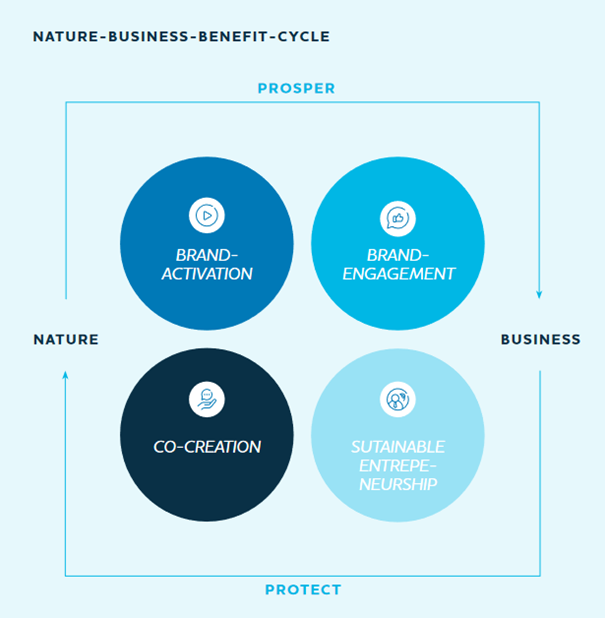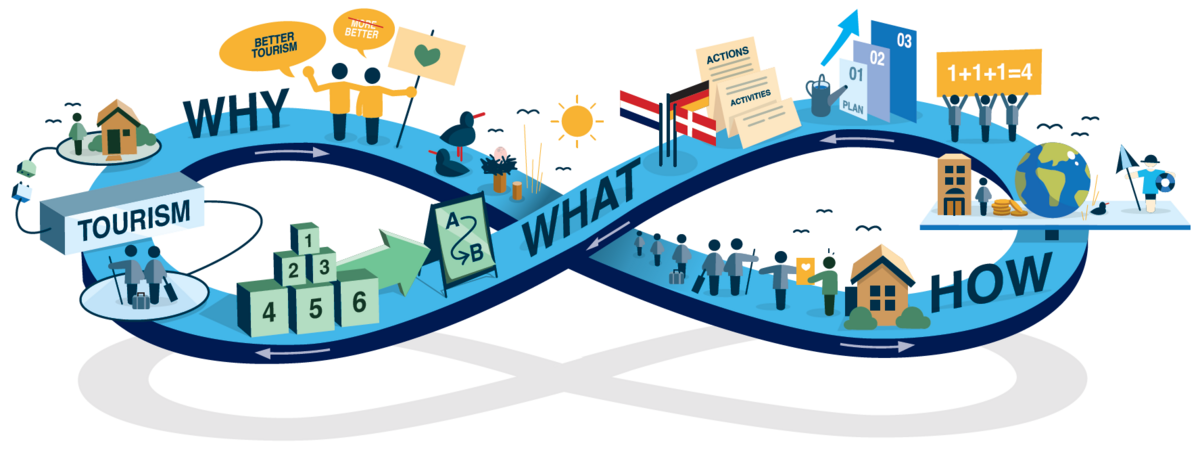Sustainable development

The Wadden Sea is a significant natural asset. It is valuable for habitat and species protection, as well as a broad range of ecosystem services, like biodiversity, climate regulation, health, and food. Preserving natural resources is a fundamental contribution to environmental sustainability. In addition, the World Heritage and its intrinsic value make an important instrumental contribution for sustainable development providing economic and social benefits. The Trilateral Wadden Sea Cooperation (TWSC) works towards increasing understanding and cooperation between nature conservation and the business sector. Our concept of sustainable use is based on the definition contained in the Convention on Biological Diversity (CBD) and reflected in the Wadden Sea Plan and The SIMP Integrated Management Plan for ONE Wadden Sea World Heritage (SIMP).
Linking nature and business
In working together with stakeholders and taking action to protect the environment, businesses can help create a more sustainable and prosperous future for all. The Trilateral Wadden Sea Cooperation (TWSC) builds its efforts in sustainable development on the so-called “nature-business-benefit-cycle” (NBBC). The NBBC is the understanding that businesses can access nature brands for economic benefits, while in turn contributing to nature protection and thereby supporting the nature brand, which will further enhance the potential for sustainable economic use by businesses.
The cycle was developed within the framework of Interreg North Sea Region project “PROWAD Link – Protect and Prosper” (2018-2022) and focusses on four main themes:
Brand activation
Nature areas can become powerful brands. However, as with any brand, they need continuous attention. Having defined and formalised the Wadden Sea World Heritage brand (Interreg project “PROWAD” 2011-2015), the Site now focusses on operationalising, communicating, and measuring the brand. An online brand guidance provides comprehensive brand and engagement guidelines to help create a sound Wadden Sea World Heritage connection and support effective and unique storytelling. A free-to-use online content pool gives access to photos, videos, texts, and others.
Co-creation
The exchange of ideas between small and medium-sized enterprises (SMEs) improves existing products and business models. Within the trilateral cooperation, many co-creation processes were initiated in the framework of PROWAD LINK and are currently being further developed within regional partner programmes, the transnational Partnership Hub, and on the Wadden Sea World Heritage Exchange Platform.
Sustainable entrepreneurship
Sustainable entrepreneurship is an approach to starting, managing, and growing a business that focuses on creating economic, social, and environmental value simultaneously. One of the main ingredients to sustainable entrepreneurship is knowledge to recognise the interdependence of economic success, social well-being, and environmental health. Factors to create businesses that not only thrive in the present but also contribute positively to a more sustainable and equitable future can be found under “resources” as well as on an external online resource pool for sustainable tourism entrepreneurship.
Brand engagement
Engaging with stakeholders is essential to a strong Wadden Sea World Heritage brand and a functioning nature-business-benefit-cycle. Focusing on long-term collaboration in regional and transnational partnerships, the TWSC continuously works on enhancing and developing partner networks. At a transnational level, the Wadden Sea World Heritage Partnership, a “network of networks”, was developed as transnational multi-stakeholder partnership (UN Sustainable Development Goal #17). The so-called Partnership Hub connects local and national partner programmes and networks in support of knowledge exchange, transnational activities, and project developments. Projects and activities developed within the Hub are eligible to use the Wadden Sea World Heritage brand. The direct link to the World Heritage Site increases the visibility of individual projects and raises the profile of the Wadden Sea World Heritage Site. The Wadden Sea World Heritage Exchange Platform is a virtual space for stakeholders and networks to thrive together, learn from each other, and jointly develop new ideas.
Sustainable tourism
Balancing tourism and nature conservation in the Wadden Sea is an ongoing challenge, but it is crucial to ensure the preservation of this unique and biodiverse ecosystem.
The trilateral strategy on “Sustainable Tourism in the Wadden Sea World Heritage Destination” was developed by the TWSC in a participatory approach with relevant local and regional stakeholders (Interreg project "PROWAD - Protect & Prosper"). The strategy aims to enhance awareness of the obligation to protect the Wadden Sea’s Outstanding Universal Value (OUV), promote high-quality sustainable tourism products and activities, and provide benefits to, local communities.
The strategy’s implementation is an ongoing work theme for the Cooperation and contributes to the aims and objectives of the World Heritage Convention. It is coordinated and supported by the trilateral Network Group Sustainable Tourism (NG-ST), which consists of representatives of ministries for the environment and economy, nature conservation agencies, tourism and marketing organisations, and green NGOs.
The tourism strategy is being implemented through an Action Plan in cooperation with tourism stakeholders from the Wadden Sea regions. The implementation and progress of the Action Plan is based on voluntary commitment of the participating partners and stakeholders. There are successful existing local, regional, national, and trilateral initiatives throughout the entire area, creating synergies and new partnerships to strengthen the cooperation and commitment of stakeholders.





